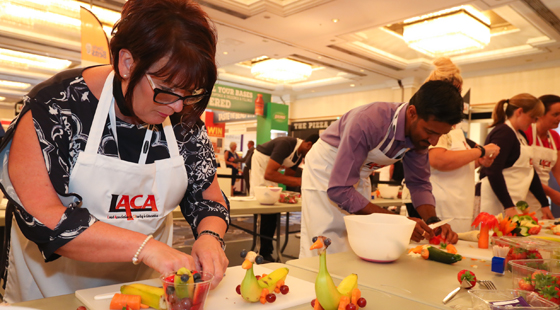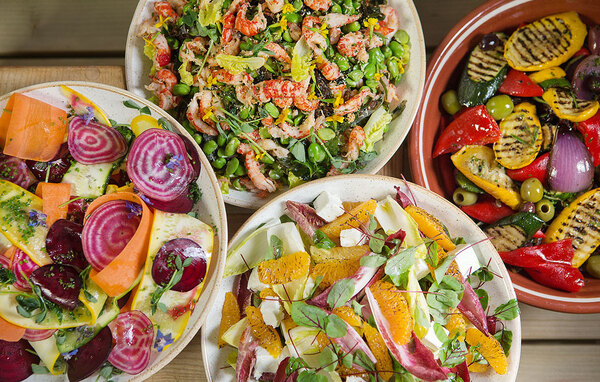School of hard knocks: how to keep meals on the curriculum
The nationâs school meals service is in a perilous position, as it grapples with political manoeuvring and rising food costs, the sectorâs annual conference has been told.
The Conservative partyâs decision to drop its controversial manifesto pledge to axe universal infant free school meals might have been a cause for celebration for the Lead Association for Catering in Education (LACA). The Toriesâ bid to save £650m a year would have led to predicted job cuts of up to 17,000 and, according to critics, caused untold harm to the health, wellbeing and life chances of thousands of pupils. Following a successful media campaign, joined by high-profile chefs including Jamie Oliver, Theresa May ditched the proposal from the Queenâs speech and the decision was confirmed just days before LACA staged its annual âmain eventâ at the Hilton Birmingham Metropole.
However, the mood was far from jubilant, as speakers and senior officials pledged to campaign with renewed vigour to protect the service from future threats.
The school meals budget has been seen as a cash cow by successive political administrations, and the policy has faced the axe twice in two years. LACA resolved to push for independent evaluation to protect universal infant free school meals (UIFSM) from future uncertainty.
Outgoing LACA national chair Sally Shadrack led calls for a comprehensive examination of UIFSM by the Department for Education to provide definitive proof of its benefits. Shadrack said research would cost only 1% of the annual cost of the scheme and would protect the service for future generations.
Labourâs shadow minister for public health, Sharon Hodgson, told delegates free school meals needed to be viewed in the same way as universal education and healthcare. Hodgson, chair of the All-Party Parliamentary Group on School Food, said: âWe do have to win the argument, not just with the politicians but with the country as a whole.â
She urged school caterers, head teachers and governors to invite their local MPs to dine with pupils to see the positive impact of the service, and to hear compelling stories from children. âDonât assume they will know about the school food sector. You have to educate them and make the argument,â added Hodgson.
Andy Kemp, group sales and marketing director for Bidfood, launched an impassioned defence of UIFSM, saying there had been a sea change in attitudes with people of all political complexions âbeginning to think socially.â
Kemp was critical of industry bodies that had not rallied to support LACA in the fight to save UIFSM. He said: âBritain has become an uncaring society, particularly if you are living on a high salary or you are a captain of industry. The reason I got engaged was I probably see myself as a captain of industry, but you have only got to look around life and see the work people are doing, particularly in schools, and you recognise this is for tomorrow. Any captain of industry wants someone coming through for tomorrow that will work with them.â
He said a lot more work was required to safeguard UIFSM, adding: âI donât think the game is won. Weâve won a stage. We have to bring together every single body in our industry and fight this, to make sure this is never reversed.â The comments were echoed by several speakers at the final panel session, including Linda Cregan, chief executive of the Childrenâs Food Trust, who said the accumulation of hard evidence via evaluation was âthe only way we are going to win the argumentâ and protect UIFSM. She asked: âWhy is food still a political football? We are talking about feeding children.â
The three-day event featured a busy schedule of food masterclasses, competitions, including LACAâs salon culinaire, the gala night awards and an exhibition by food producers and equipment and service suppliers. However, UIFSM dominated the conference, and the tough decisions facing
managers for the new school year were laid bare in research unveiled by LACA.
A survey of schools, contract caterers and local authorities revealed that 96% have been hit by a rise in food prices, 83% by the increasing cost of labour and 49% by a hike in the price of fuel, which have affected meal delivery costs. Almost half of respondents (49%) said they had been forced to increase the price of school meals in 2016-17. Of these, 81% said they had increased prices by up to 10p.
The picture is set to worsen for 2017-18, with 60% of respondents planning to increase the cost of school meals. Of these, 84% are planning individual meal increases of up to 10p.
In the face of rising food costs, there were worrying findings about the steps schools are considering to balance the books. The most likely course of action is to retender or renegotiate deals with suppliers, cited by 74% of schools. However, other cost-cutting measures, flagged up by 61% and 58% of respondents respectively, are âadjusting menusâ to feature cheaper items and the substitution of ingredients/menu items for cheaper alternatives. Worryingly, 43% of schools are considering cutting staff or reducing hours, while 11% are looking to serve more convenience food.
Common problems
The challenges ahead may be considerable but they are shared by LACAâs colleagues across in the US, according to child nutrition expert Katie Wilson, deputy under-secretary for food, nutrition and consumer services at the US department of agriculture during the Obama presidency. She was responsible for developing and promoting science-based dietary guidance and administering the departmentâs 15 nutrition assistance programmes. She told delegates there were similarities between the US and the UK over school meals provision.
Wilson said the US had developed the idea of the nutrition safety net and âschools meals are the best safety net we have.â She added: âAs children walk through the door and come to school, nobody can take that food away.â
The notion that feeding children should be spoken about in relation to family income levels was challenged by Wilson. She said buses go to remote spots to transport children to school and income is never raised by policy-makers. âWe give them [children] a desk to sit at. We give them school books and sometimes pens and paper. We give them a great teacher, well trained. We donât ask them what income level they are on. One of the tools that makes children successful in high school, and a more productive citizen, is nutrition. And we turn around and we ask them for an income level.â
Wilson said it was important to question preconceptions that poor families have a hard time caring for children, while wealthy families always feed their offspring well. She outlined how one in 10 households in the US has children who are âfood insecureâ, yet more than one in three is overweight or obese.
Wilson said it frustrated her when politicians asked how a rich child can be hungry. She added: âAn obese child can be hungry. They may be eating the wrong kind of food, or in a violent neighbourhood and canât get outside.
âWe have the same challenges. We have the same issues politically. We are in the fight of our life to keep our programmes because we have an administration right now that isnât too interested in feeding children in our schools. We have children that prefer the foods they can purchase on the high street, so we have some of the same challenges.â
Feeding children during the holidays: Cardiff Food Partnership The transformative effect of providing meals for children during school holidays was outlined by the Cardiff Food Partnership.
The Summer Holiday Enrichment Programme (SHEP) was launched to plug the gap in the provision of free school meals and to address issues relating to nutrition and isolation.
Wales has some of the UKâs highest child poverty and obesity rates, and some of the lowest rates for academic attainment, yet the 67,000 pupils on free school meals cannot access two free meals a day during the holidays.
To tackle this, Food Cardiff teamed up with Cardiff Council Education Catering, Sport Cardiff, and Cardiff and Vale University Health Board. Under the scheme, children receive breakfast and lunch, as well as food education and the chance to take part in sport. Five Cardiff schools took part in the 2015 pilot, which was extended to 10 city schools, and eight schools in four other Welsh local authorities, in 2016. This year, 12 local authorities and a total of 39 schools will participate.
Evaluation showed that 98% of children reported eating breakfast at a club and 75% reported eating a healthy lunch. Additionally, 75% said they made new friends and 75% achieved the recommended 60 minutes of moderate to vigorous physical activity per day.
Other key findings included:
⢠67% children consumed more fruit and vegetables
⢠66% ate fewer sugary snacks
⢠81% drank fewer sugary/fizzy drinks
⢠77% of the children would have stayed inside (playing on a computer/watching TV) if there was no holiday food and fun club
⢠53% of parents said the scheme helped make food last longer at home





















